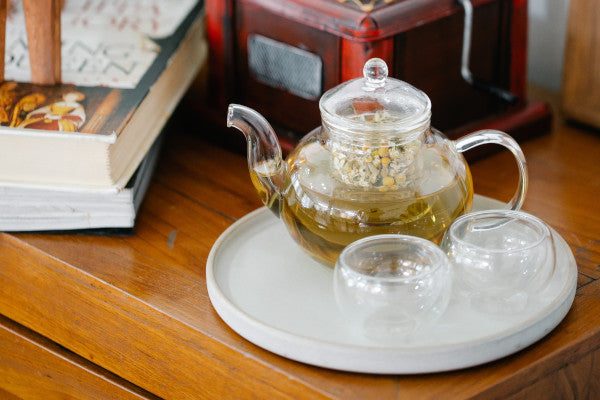When a woman is pregnant, there are several foods she can eat to relieve discomfort. Many wonder if ginger is one of them. However, it has been used to relieve morning sickness during pregnancy, which could be an effective natural remedy. In this article, we'll talk about ginger tea during pregnancy. Is it safe?
This food, also known as ginger root, consists of a rhizome or thick stem from the Zingiber officinale plant. Its taste is bitter, but it's tasty, and it's commonly used in various recipes and in different ways. For example, in making cookies, cakes, and tea. But the question we must ask ourselves: is ginger tea safe during pregnancy?
Among ginger's characteristics is its refreshing and distinctive flavor: it is pungent, spicy, and penetrating. Among its properties, this plant has been shown to be an effective antiemetic in cases such as motion sickness, post-anesthesia, chemotherapy, hyperemesis gravidarum, and dyspepsia. It can also be used in various forms: essential oil, dried, fresh, roasted, or juice.

Looking at the properties of ginger, we can see why it's recommended for pregnant women experiencing nausea and vomiting. Various clinical practice guidelines recommend the use of ginger for these symptoms during the first trimester of pregnancy. Nausea and vomiting are the symptoms that most affect pregnant women and are one of the reasons for sick leave.
What does ginger cause in pregnancy?
Although many plants and herbs are used in infusions and teas and are safe to consume at any time, it's also true that some may not be advisable during pregnancy. This may be because their safety has not yet been established, or because they may cause side effects. In this regard, the most prudent thing to do is to take the necessary measures.
Regarding ginger, studies have shown that it's safe to consume in normal doses, but always keep them small. When consuming ginger, it's recommended that it be fresh and natural, with medical approval, as it has its contraindications. It's recommended to consume it during the first months of pregnancy, specifically during the first trimester or 20 weeks of gestation. This is when women experience nausea and hyperemesis (frequent vomiting).
Moderation is key when taking it, and we can do so throughout the rest of the stages, always with caution. However, in the case of supplements, it's best to avoid them in the weeks closest to labor, as this could cause more bleeding during delivery.
There are studies that indicate that ginger tea is not a good idea during pregnancy because it can lead to bleeding disorders or miscarriage. It's best to consult your doctor if you decide to include it in your diet.
How do you make ginger tea for pregnant women?

Studies indicate that consuming less than 1 gram of ginger per day to treat nausea and vomiting during pregnancy is perfectly safe. This amount is equivalent to 1 teaspoon (5 g) of grated ginger or 4 cups of tea, which is 950 ml. However, to take advantage of ginger's diverse benefits during pregnancy, it is best to prepare it traditionally.
To make ginger tea, use one teaspoon of freshly grated ginger and two cups of water. Add the water to a pot and heat it. While it boils, peel and grate the ginger. When the water begins to boil, add the grated ginger and let it boil for about 10 minutes. Then, strain and serve.
Ginger tea is good during pregnancy. You can find it in capsule form, although you should make sure it contains only ginger extract, without any additives or other unsuitable ingredients. On the other hand, some women have indicated that crystallized ginger can be effective in combating morning sickness. Although it has a downside, it tends to contain a lot of sugar, so drinking it is not recommended.
In addition, ginger contains small doses of other compounds that are essential for the body, especially for pregnant women, such as iron, folic acid, and vitamin C. However, its greatest contribution is adding flavor to meals without resorting to salt. We know that excess sodium is harmful to health, not just during pregnancy. Eating this root will help you reduce the amount of salt you consume when preparing fish, soups, and other dishes.
Are you a coffee shop owner in Madrid, Barcelona, or Valencia looking to offer a unique tea experience to your customers? We have the perfect solution for you! At Tetique, we offer the highest quality loose teas and fruit infusions to meet your customers' needs.
Why is ginger an abortifacient?

Various plants or herbs contain compounds that can stimulate the onset of contractions, thus causing a miscarriage, especially in the early months of pregnancy. In this regard, is ginger tea safe during pregnancy? Pregnant women are generally advised not to ingest medicinal plants of any kind, or they can be done only with a doctor's prescription.
For the reasons stated above, before you decide to drink any type of natural infusion, you should consult your doctor. This way, you'll protect both your health and that of your baby. It's false that eating ginger causes miscarriage. It's also believed that consuming it increases menstrual flow and weakens intrauterine tissues.
However, you should know that ginger tea , or ginger in any form, is contraindicated in the following cases:
- Anticoagulant treatment. Certain medications are used to prevent blood clots; we have them at home or have already used them. If you take ginger, you should avoid aspirin, ibuprofen, heparin, warfarin, and naproxen.
- Those on hypertension treatment. Ginger has the ability to unintentionally lower blood pressure, which would not be appropriate for medication, especially if you are taking diltiazem, nifedipine, amlodipine, or isradipine. It could even cause cardiac arrhythmia.
- It lowers blood sugar. Diabetics should not consume ginger because it can cause alterations that damage the blood system, resulting in a drop in blood sugar.






